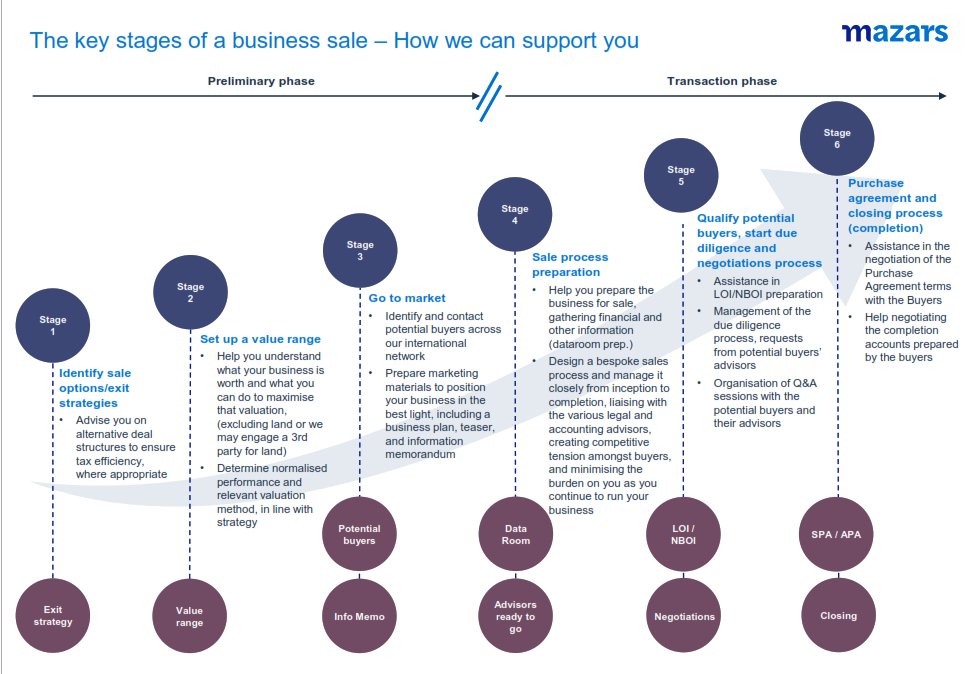
What is a business to business or trade sale and what are the benefits?
What is a business to business sale?
A business to business sale is a transaction involving a sale to another business typically operating in the same industry or sector, and could be either based in Australia or overseas. This option involves taking a number of legal, financial, and structural steps to prepare your business for sale.
What are the benefits?
Selling to another business owner is often the cleanest form of transaction, and vendors often achieve the full value of the business on day one.
Given the third-party buyer is likely to have familiarity of your sector/industry, in many cases this can make the sale process more efficient as the potential buyer understands the characteristics and demands of the industry.
This type of sale often allows the owner who is exiting, time to explore new opportunities that could involve new business ideas, consideration to diversify business assets into other investments or simply provide more time spent with your family. The proceeds of sale can sometimes aid retirement or other personal, financial objectives by realising the investment of the business in full.
However, in some cases, if you wish to stay involved in the business, there is the opportunity to build a role within the acquiring group. External business buyer negotiations can be more ruthless as personal relationships may not be as important or relevant. With less emotion attached to the negotiations over other transition options, it means that if a potential deal does not feel suitable, then it is easier to just end the process.
By structuring a competitive bidding process, with a number of potential buyers bidding for the business, the outcome sale price is often higher compared to conversations held with just a single potential buyer. Opportunities may exist to generate synergies on the acquisition and as a result, a buyer may potentially pay more for your business as a result.
What’s next if you are considering this type of sale?
Your first stop should include a robust, independent valuation of the business and its future income. An audit of your financial systems is also important to identify any potential barriers. These can then be addressed or reflected in the sale structure or strategy. The next step is to identify resources to deliver the sale and solidify your time frames. Along with the sale negotiations, a full personal, financial and investment plan should also be drawn up for the proceeds of sale, considering tax implications and future personal objectives.
How can we support you?
Our deal advisory specialists can support you through all stages of the business sale process. We will work with you to:
Stage 1: Identify sale options / exit strategies
- Advise you on alternative deal structures to ensure tax efficiency, where appropriate.
Stage 2: Set-up a value range
- Help you understand what your business is worth and what you can do to maximise that valuation, (excluding land or we may engage a 3rd party for land).
- Determine normalised performance and relevant valuation method, in line with strategy.
Stage 3: Go to market
Identify and contact potential buyers across our local and international networks.
If you require assistance or want to know more, please contact your usual Mazars advisor or alternatively our experts via the form below or on:
| Brisbane – John Kotzur | Melbourne – Brad Purvis | Sydney – Maximilien Amphoux |
| +61 7 3218 3900 | +61 3 9252 0800 | +61 2 9922 1166 |
Author: Zoe Davies, James Robinson, and Paul Joyce
Published: 06/09/2023
All rights reserved. This publication in whole or in part may not be reproduced, distributed or used in any manner whatsoever without the express prior and written consent of Mazars, except for the use of brief quotations in the press, in social media or in another communication tool, as long as Mazars and the source of the publication are duly mentioned. In all cases, Mazars’ intellectual property rights are protected and the Mazars Group shall not be liable for any use of this publication by third parties, either with or without Mazars’ prior authorisation. Also please note that this publication is intended to provide a general summary and should not be relied upon as a substitute for personal advice. Content is accurate as at the date published.








